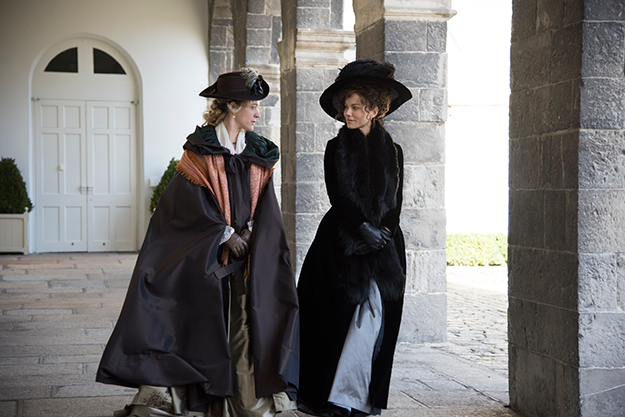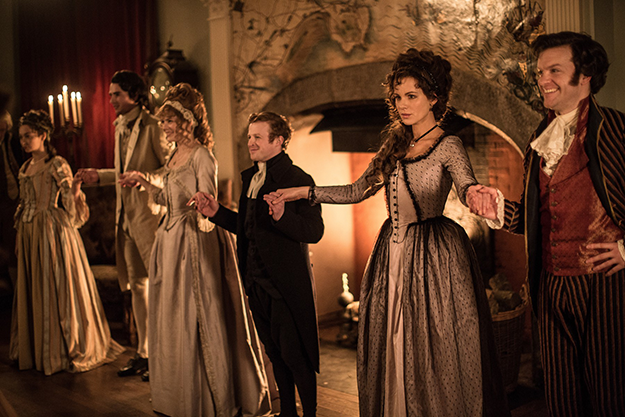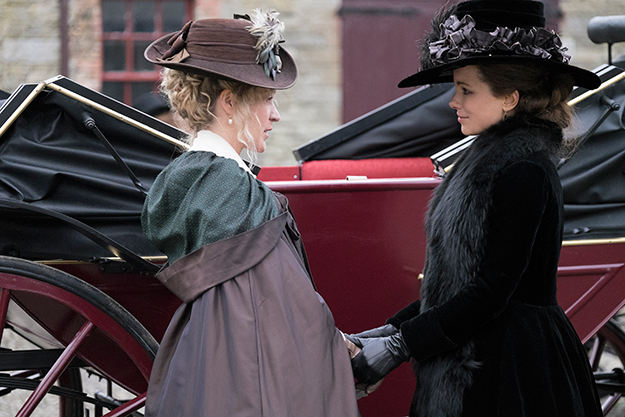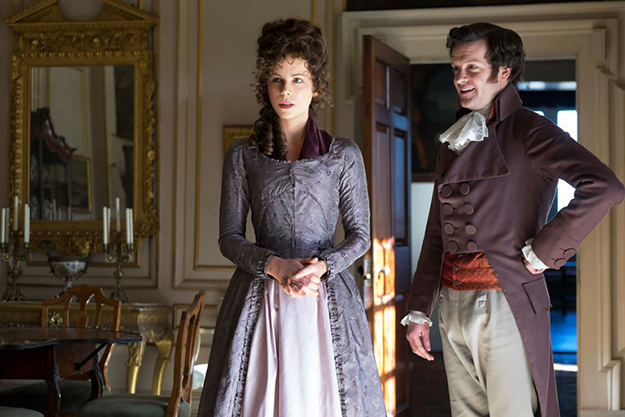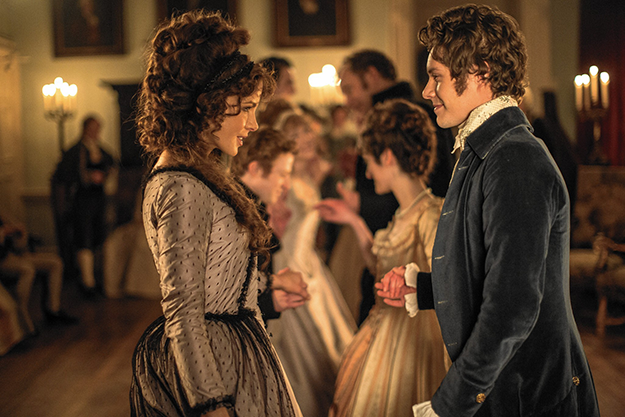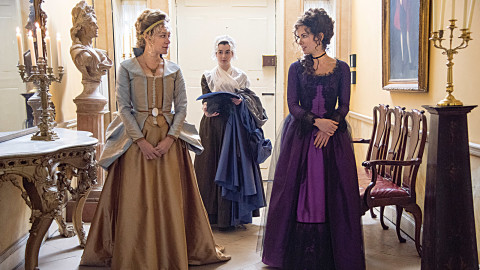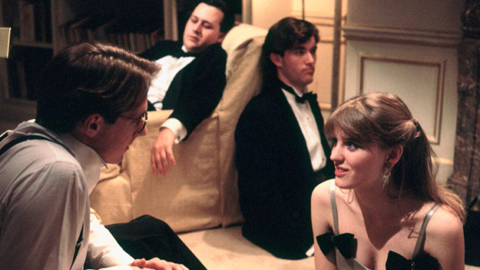Film of the Week: Love & Friendship
One of the most beautiful objects in Whit Stillman’s Love & Friendship is a cake—a perfect 1790s cake. It’s gorgeously designed and presented, and looks altogether historically plausible as just the kind of treat that might have been served at an English social event of the period, or that might have appeared in a still life or in the background of a contemporary social portrait. But it also somewhat resembles other cakes that we may have seen in other elegantly mounted historical films. The cake says “historical authenticity”—it’s a safe bet that the film’s culinary department looked deep into recipe books of the late 18th century—but it also says “English literature costume drama,” signaling a genre as overtly as do all the flounces and furbelows lovingly created by Stillman’s costume department.
The cake and the costumes play a more ambivalent role than they normally might in other such films, for Love & Friendship perplexingly, and knowingly, occupies so many niches at once. It’s a historical costume comedy; it’s an example of a specially privileged and prestigious subset of that genre, the Jane Austen adaptation; and it’s that very singular thing, a cinematic subgenre all of its own, a Whit Stillman film. It’s all these things at once, and somehow also an artful, super-knowing parody of all these things. I am, as a character in the film might say, quite at my wits’ end to know what to make of it.
The film is Stillman’s fifth feature, and his second since the witty college-set comedy-musical Damsels in Distress (11) broke a 13-year absence. It’s based on Lady Susan, an early novel of Austen’s, written in epistolary form; confusingly, it also takes its name from another early work, Love and Freindship (sic—the misspelling was Austen’s). Stillman’s film begins with the sudden departure of a coach from a stately home, and a flurry of images and captions presenting its characters in heightened self-conscious fashion: each is identified in a portrait-like shot with a framing “vignette” blur, with captions identifying them more than a touch whimsically: “Lord Manwaring—a divinely attractive man”; “Sir James Martin—a bit of a ‘rattle.’”
The abrupt departure is that of the widowed Lady Susan Vernon (Kate Beckinsale), who is perhaps not mad, but is certainly bad and dangerous to know. She’s beautiful, cunning, and worldly-wise, and passes from house to house, staying with a succession of friends and relations, moving on when things heat up—which they do, for she is “the most accomplished flirt in all England,” notorious for her “extravagance and dissipation.” “We don’t live, we visit,” she at one point tells her daughter, her elegant rootlessness evocative of those high-society flibbertigibbets grifting off wealthy acquaintances in Hollywood comedies of the ’30s. Having left one house, she and her friend, or rather, reluctantly unpaid attendant Mrs. Cross—“Helps pack and unpack,” the caption tells us—visit the house of her late husband’s brother and sister-in-law, Charles and Catherine Vernon. As she approaches their country seat Churchill, Stillman plants a neat disconnect between the characters’ experience and that of the audience eagerly soaking up a period spectacle; DP Richard Van Oosterhout gives us a gorgeous, romantic view of the Vernon estate from Lady Susan’s coach, before the jaded Lady Susan wearily pronounces the place a “hole.” The one thing that characters in a period drama should never be impressed with is period splendor.
At Churchill, Lady Susan takes an interest in Catherine’s younger brother, the handsome, levelheaded but only too susceptible Reginald DeCourcy (Xavier Samuel). Later, however, her scheming is interrupted by the arrival of her young daughter Frederica (Morfydd Clark), whose timid youth and artless charm make her a rival. Frederica is the target of constant jibes from this surpassingly bad mother, but Lady Susan in any case intends to get the pliable girl married off to the affable but utterly blockheaded Sir James Martin (Tom Bennett).
This is a rough synopsis, but I confess I couldn’t easily follow the plot. As a supposedly literate Englishman, I must confess a heresy: I don’t enjoy Austen that much, and on a certain level, I don’t entirely get her. Certainly, as the bons mots cascaded and warm eruptions of knowing amusement broke out around the London screening room where I watched Love & Friendship, I couldn’t help feeling a little out of the loop, as if I were the only person there uninitiated into a secret language. Partly that was because I was taking notes, and having trouble keeping up: the sheer pace of the exchanges (you could call the film’s mode “Accelerated Austen”) meant that whenever I tried to write down a character’s pithy aperçu, I ended up missing three more—and at the start of the film, several plot points. The language positively ripples past and is hard to follow unless you’re attuned to this kind of dialogue—unless you have, as it were, the Austen ear, and I willingly admit that I don’t.
Not that I couldn’t enjoy some ripely poised formulations and some witty—and to my ears, somewhat un-Austen-ish—gags. There’s a fabulous moment when Lady Susan, out walking with her confidante Alicia Johnson (Chloë Sevigny) is eagerly accosted by a gentleman who calls out her name. “How dare you sir! I will have you whipped!” she promptly ripostes. Asked if she knows him, she replies: “I know him well. I would never speak to a stranger like that.” Or take Stephen Fry’s Mr. Johnson, the London husband forever threatening to send his troublesome American wife home: “I hear the Atlantic Passage is very cold this time of year.”
Now, not having read Lady Susan, I couldn’t say how much of the text is derived directly from Austen’s original—or indeed, if any of it is. What you get, though, is a peculiar tremor of discrepancy, because the overall tone is so Stillmanesque; in much of the dialogue’s lapidary wit, but also in its occasional directness and simplicity, we could almost be hearing the speech of the Sally Fowler Rat Pack from his Metropolitan or of the upper-crust young urbanites of Barcelona or The Last Days of Disco (which also starred Beckinsale and Sevigny). So we can’t entirely be sure whether we’re getting Whit Stillman doing a very rich, accomplished Austen pastiche, or a Jane Austen movie in which the characters bizarrely speak like characters in a Stillman film.
Amid the cascades of wit, it’s easy to feel a little fatigued, even lost at moments, and for that reason I was all the more glad at the entrance of Sir James—the prize booby, and an overgrown child in a crowd of consummate adults. Sir James is a “rattle,” a hopeless buffoon—babbling with over-confident naïveté, like an embodiment of folly from a Restoration comedy who’s strayed from his proper era. Stiffly striking would-be casually dignified poses, he’s forever saying the wrong thing, wittering about the Twelve Commandments or enthusing at Frederica, “So you read both verse and poetry!” Mr. Vernon nevertheless enjoys having him around: “He brings a new angle to things.” I for one was very happy to have Sir James around; he’s an explosive presence in the film, anarchically disrupting all the surrounding poise like a frisky calf in a Royal Doulton showroom. Tom Bennett plays him pricelessly, with an eager staccato bark—with a touch of Hugh Laurie in his early comedy days, or of Harry Enfield’s sketch-show idiot Tim Nice-But-Dim.
Visually, the film is a marvel, Stillman and his team immersing themselves thoroughly in the visuals of the period: it feels more accurate as a channeling of late 18th-century pictorial references than any film I’ve seen since Eric Rohmer’s The Lady and the Duke. It’s not just that Stillman, production designer Anna Rackard, and costume designer Eimer Ní Mhaoldomhnaigh have immersed themselves in the paintings of Kneller, Gainsborough, Reynolds, and Romney (no relation), it’s in the casting too. Everyone, both facially and in their bearing, could have stepped out of a period portrait—as Catherine Vernon, Emma Greenwell has a square-jawed grace and decorum, while Justin Edwards as her decent, doughy husband has the facial chunkiness of a good Hereford bull. And Morfydd Clark’s pallid, wide-eyed Frederica has the haunted appearance of a slightly different genre—she could be the heroine of one of the Gothic novels that Austen sent up in Northanger Abbey.
The costumes too are wonderful, but it’s here that Love & Friendship announces itself as more filmic than strictly realistic; in one scene, Lady Susan and Alicia sit in a darkened coach, their clothes a flamboyant explosion of orange, blue, and pink. Lady Susan’s furs and vast black hats reveal her as a denizen, not just of a Gainsborough painting, but of the historical melodramas of Britain’s Gainsborough Studios, with their opening ident featuring a lady in a large hat: she is, as per one of that studio’s most beloved titles, The Wicked Lady.
The acting throughout captures a perfect tone—James Fleet is wonderfully bluff as DeCourcy père, while Jemma Redgrave gives his wife a wan vocal quality that is faded gentility to the tee. Jenn Murray also has a show-stopping conniption as a wronged wife. However, Beckinsale’s silky-voiced femme fatale didn’t entirely convince me—she’s too suavely knowing throughout, but stylishly malign on a rather one-note level, more an Alexis Carrington than a fully nuanced Madame de Merteuil, say.
I’m not sure where Love & Friendship properly comes in the ranking of recent Austen films, a roster still topped by Ang Lee’s sincere, emotionally direct Sense and Sensibility and by Roger Michell’s Persuasion (both 1995), the grit of which cut through the heritage neatness that often gives screen Austen a bad reputation. In spirit, it’s probably closest to Patricia Rozema’s revisionist Mansfield Park (99), which had its own somewhat anachronistic, Susan-like vamp in the predatory form of Embeth Davidtz’s Mary Crawford. Love & Friendship is pastiche of the perfect kind, in that it stretches commonplaces some way beyond the familiar. Austenites and Stillmanites alike will love it, and so will many non-initiates. Be warned, however—it is so arch that you could drive a barouche through it.
Jonathan Romney is a contributing editor to FILM COMMENT and writes its Film of the Week column. He is a member of the London Film Critics Circle.



